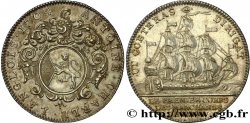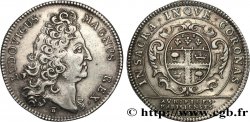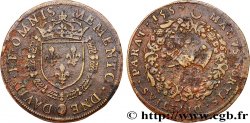fjt_079217 - CORPORATIONS Jeton Ar 30, fabricants d’étoffes d’or, d’argent et de soie 1745
Not available.
Item sold on our e-shop (2014)
Price : 95.00 €
Item sold on our e-shop (2014)
Price : 95.00 €
Type : Jeton Ar 30, fabricants d’étoffes d’or, d’argent et de soie
Date: 1745
Metal : silver
Diameter : 30,5 mm
Orientation dies : 6 h.
Rarity : R2
Coments on the condition:
Très bel exemplaire avec une usure visible notamment sur les génies, belle patine
Obverse
Obverse legend : ÆTERNUM DIGNA COLI.
Obverse description : À droite, Minerve casquée assise à gauche dirige le travail de deux petits génies ailés assis à gauche qui symbolisent le dessin et le tissage ; l’un trace le dessin, et l’autre tient une navette à la main et contemple l’ouvrage du premier ; à leurs pieds, quelques ustensiles de la fabrique ; signature à gauche D.V. ; à l'exergue en trois lignes : FABRIQUE DES ETOFFES DE/ SOYE OR ET ARGENT/ 1745..
Reverse
Reverse description : Cartouche de style rocaille aux armes de Lyon accosté d’une palme et d’une branche de laurier, signature D.V..
Commentary
Les jetons de cette corporation sont frappés en exécution du règlement du 19 juin 1744 qui prévoyait de distribuer des jetons aux quatre maîtres-gardes-marchands en charge et par portions égales, pour leur droit d’assistance à l’assemblée hebdomadaire. Les coins sont de Jean Duvivier qui les a exposés au Salon de 1746.








 Report a mistake
Report a mistake Print the page
Print the page Share my selection
Share my selection Ask a question
Ask a question Consign / sell
Consign / sell
 Full data
Full data



